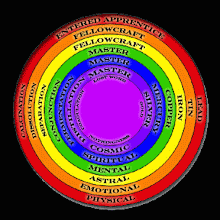Journey to the center of the mandala, the journey to “Cosmic Consciousness”.
It is my belief, the ultimate goal of all who journey to the center of the mandala of freemasonry, is “Cosmic Consciousnesses”.
I found this beautiful poem by Rumi:
You have said what you are.
I am what I am.
Your actions in my head,
My head here in my hands
With something circling inside.
I have no name
For what circles
so perfectly.
A secret turning in us
Makes the universe turn.
Head unaware of feet,
And feet head. Neither cares.
They keep turning.
This moment this love comes to rest in me,
Many beings in one being.
In one wheat grain a thousand sheaf stacks.
Inside the needle's eye a turning night of stars.
As I sat and tried to formulate my explanation of cosmic consciousness, I came across this old article written in 1920 by a brother mason named Alfred Henry.
The New Age Magazine
By Scottish Rite (Masonic order). Supreme Council for the Southern Jurisdiction
Published by Supreme Council, 33, Ancient and Accepted Scottish Rite of Freemasonry of the Southern Jurisdiction, U.S.A., 1920
BY ALFRED H. HENRY, 32°, K. C. C. H.
THE Nirvana of the East— of Buddhism and other faiths, — is not "Nothingness or Annihilation." Any such interpretation of the doctrine is a result of utter misunderstanding. The illuminating editorial on the "Cosmic Consciousness," in the December NEW AGE, shows this clearly. Nirvana is correctly spoken of as "A future without end," "Repose after limitless experience," "Peace which nothing can disturb." It is not escape from the limitations of an individualized consciousness by a plunge into unconsciousness, but a rise, through expansion and development, into that state where these limitations are outworn and cease to exist, and where consciousness ceases to be individualized because it has come to know itself as the all-consciousness. Rightly understood, this is also the doctrine of Christ, and of His mediator- ship between God and every upward- mounting soul. When the Great Teacher said, "I and my Father are one," He meant that the Christ-consciousness, which was His, was at one with the all- consciousness of God, and, as this Christ-consciousness was also the perfected consciousness of Humanity, so all men must come to the Father through Him — by rising, through expansion and development, until the limitations of an individualized unit of consciousness have been transcended and the aspirant knows himself as Humanity at one with the Father. Seeing this truth like a flaming light, Paul, the initiate, exclaimed exultingly, "I live, but not I. The life which I now live has risen above the limitations of a circumscribed individuality and has found itself in Christ." Christ's teaching is clearer than that of Buddha, and more helpful, in that it makes plain the truth, that the next stage in the development or expansion of the aspiring individual consciousness is the consciousness of Humanity, at the point where it knows itself as Humanity and knows also that it is essentially Divine. It was because Christ knew himself, not as a man, but as Humanity and as Divine, that He could say, ' ' No man cometh unto the Father but by me." It is therefore, not by escape from Humanity — as the Church too often teaches — that man mounts upward or attains his salvation or his initiation, but by identifying himself with Humanity by merging or refocusing his consciousness into that of Humanity — as Christ Himself did — that he advances on his way to the great goal of final liberation. At his present stage, it is the individualized self-consciousness of man that is most in evidence. Man loves his limited self and is not willing to lose it. It seems to him to be his very life and the only immortality, which appeals to him or attracts him, is a perpetuation of this individualized and therefore limited, self-consciousness, which he feels to be himself. To him the Great Teacher says, "If you would save your life, you must lose it." "Come unto me and I will give you life." The larger life is, therefore, not a perpetuation of the limited life but a complete losing of it, and a re-finding of itself in a life unlimited and eternal. This is the real teaching of Christ and the real teaching of Buddha. Eternal Life, and Nirvana, are each won by a self-denial, a forsaking of self, a self-crucifixion, that is absolute and real and that seems like "annihilation" and "nothingness" to the mortal who has not learned the higher truth. This also is the teaching of Masonry and is especially clear to the earnest student of the sublime principles of the interior doctrine of the Ancient and Accepted Scottish Rite.











No comments:
Post a Comment